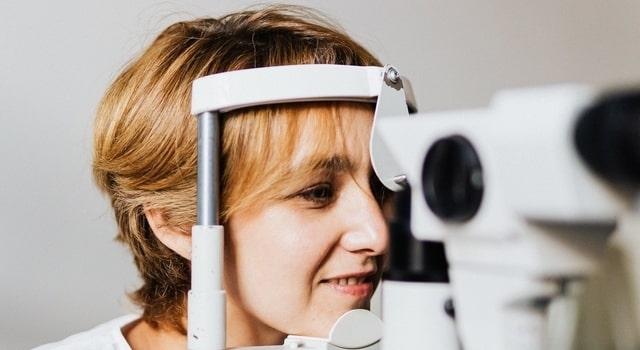
When it comes to caring for your eyes, it’s important to understand the difference between a quick vision check and a more thorough comprehensive eye exam. While both serve important roles in ensuring you can see clearly, they vary significantly in scope.
At Cockrell Eyecare Center, we believe that comprehensive eye care is key to maintaining healthy vision and detecting potential issues early.
Here’s what you can expect during a comprehensive eye exam and how it differs from a basic vision check.
Early Detection of Age-Related Eye Conditions
As we get older, the risk of developing eye conditions that affect vision rises significantly. Cataracts, for example, cause clouding of the eye’s lens and can severely impair vision if left untreated. Glaucoma, often called the “silent thief of sight,” develops gradually and can lead to permanent vision loss if not caught early.
Meanwhile, age-related macular degeneration (AMD) can damage the part of the retina responsible for sharp central vision.
What Is a Basic Vision Check?
A basic vision check is a quick test that measures how well you can see. It’s often done as part of a routine health check, at the DMV, or in schools. The main goal of a vision check is to determine whether you need corrective lenses.
Here’s what a basic vision check typically includes:
- Visual Acuity Test: This is the classic eye chart test, where you’re asked to read letters from a chart at various distances. This test assesses how clearly you can see both near and far.
- Refractive Error Detection: If you struggle to see clearly, the test may indicate that you have a refractive error, such as nearsightedness (myopia) or farsightedness (hyperopia). You may be referred for a more in-depth exam to determine your prescription.
While a vision check helps identify if you need glasses or contact lenses, it doesn’t provide a full assessment of your eye health.
What Is a Comprehensive Eye Exam?
A comprehensive eye exam goes far beyond checking your vision. It’s a detailed evaluation of both your vision and the overall health of your eyes. This type of exam, performed by an optometrist or ophthalmologist, involves a series of tests that assess different aspects of your eye health.
Here’s what you can expect during a comprehensive eye exam at Cockrell Eyecare Center:
Medical and Vision History Review
Your eye care provider will begin by reviewing your overall health and eye health history. This helps identify any potential risk factors, such as a family history of glaucoma, diabetes, or other health conditions that could affect your eyes.
Visual Acuity and Refraction Testing
Like a basic vision check, a comprehensive eye exam includes a visual acuity test to measure how well you can see at different distances. However, a comprehensive exam also includes refraction testing to determine your exact prescription for glasses or contact lenses.
Eye Movement and Coordination Testing
Your optometrist will check how well your eyes move and work together. This is important for tasks such as reading, focusing, and following moving objects. Poor eye coordination can cause headaches, double vision, or eye strain.
Eye Pressure Measurement (Tonometry)
One of the key differences between a vision check and a comprehensive exam is that a comprehensive eye exam includes tonometry, a test that measures the pressure inside your eyes. This test helps detect glaucoma, a condition that can lead to vision loss if not treated.
Pupil Dilation and Retinal Examination
To thoroughly examine the back of your eyes, your optometrist may use eye drops to dilate your pupils. This allows for a detailed view of the retina, optic nerve, and blood vessels.
By examining these structures, your optometrist can detect early signs of conditions like macular degeneration, diabetic retinopathy, and retinal detachment.
Visual Field Testing
A comprehensive eye exam also includes a visual field test, which assesses your peripheral vision (side vision). This test can detect blind spots or other issues that may indicate underlying eye conditions or neurological problems.
Slit Lamp Examination
Using a slit lamp microscope, your optometrist will examine the front part of your eyes, including the cornea, lens, and iris. This test helps detect problems like dry eyes, cataracts, and corneal injuries.
Why Comprehensive Eye Exams Are Essential
While basic vision checks are helpful for identifying if you need corrective lenses, they don’t provide the full picture of your eye health. Comprehensive eye exams, on the other hand, ensure that potential issues are detected early, preventing vision loss and maintaining overall eye health.
Comprehensive Eye Exam and a Basic Vision Check
- Depth of Evaluation: A basic vision check only measures your ability to see clearly, while a comprehensive eye exam assesses the health of your entire eye.
- Early Detection of Eye Conditions: Comprehensive eye exams can detect serious eye conditions like glaucoma, cataracts, and macular degeneration before they cause symptoms.
- Personalized Eye Care: A comprehensive exam provides a detailed understanding of your eye health, allowing your optometrist to recommend personalized treatments and vision correction options.
- Health Monitoring: Comprehensive exams can reveal signs of broader health issues, such as diabetes, high blood pressure, and autoimmune disorders, which can affect your eyes.
Request an Appointment for a Comprehensive Eye Exam
At Cockrell Eyecare Center, we prioritize your eye health through thorough, personalized care. If it’s been a while since your last comprehensive exam or you’ve only had a basic vision check, it’s time to schedule a more detailed assessment.
Request an appointment with us and ensure that your eyes are healthy and your vision is protected.
